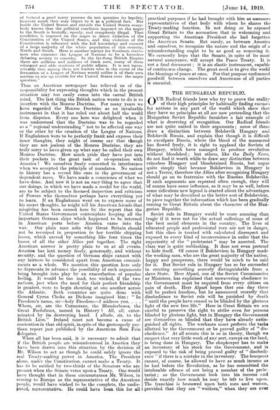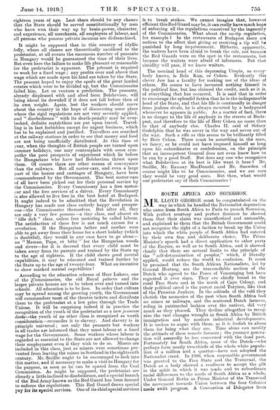THE HUNGARIAN REPUBLIC.
()CH Radical friends here who try to prove the reality of their high principles by habitually finding excuses for nations in any part of the world which show that they have no principles at all are now pretending that the Hungarian Soviet Republic furnishes a fair example of what is deserving of recognition. Our Radical friends are not quite united in their arguments ; some of them draw a distinction between Bolshevik Hungary and Bolshevik Russia, and explain that though it is difficult to exculpate Russia, where the blood of the massacred has flowed freely, it is right to applaud the Soviets of Hungary, which have managed to produce revolution without bloodshed ; but others, like the Daily News, do not find it worth while to draw any distinction between crimeless Hungary and bloodstained Russia, but argue quite simply that because Bolshevism in Hungary is not a Terror, therefore the Allies after recognizing Hungary should go on to fraternize with the Russian Bolsheviks. If such arguments are repeated often enough, they will of course have some influence, so it may be as well, before some ridiculous new legend is started about the advantages of what may be described as the better sort of Bolshevism, to piece together the information which has been gradually coming to Great Britain about the character of the Hun- garian Republic.
Soviet rule in Hungary would be more amusing than tragic if it were not for the actual sufferings of some of the best social elements in the country. The lives of educated people and professional men are not in danger, but this class is treated with calculated disrespect and exposed to every kind of inconvenience in order that the superiority of the " proletariat " may be asserted. The class war is quite unblushing. It does not even pretend to hide itself. Of course if Bolshevism in Hungary made the working men, who are the great majority of the nation, happy and prosperous, there would be much to be said for it. But Soviet rule in Hungary has so far succeeded in erecting something scarcely distinguishable from a slave State. Herr Alpari, one of the Soviet Commissaries or Ministers, has explained that unwavering obedience to the Government must be required from every citizen on pain of death. Herr Alpari hopes that one day there will be perfect freedom, but he announced recently that disobedience to Soviet rule will be punished by death "until the people have ceased to be blinded by the glorious light of the new free life." Here in Great Britain we are careful to preserve the right to strike even for persons blinded by glorious light, but in Hungary the Government are themselves so blinded that they have already extin- guished all rights. The workmen must perform the tasks allotted by the Government or be proved guilty of "dis- obedience." At all events this is so in theory, though we suspect that very little work of any sort, except on the land, is being done in Hungary. The shopkeeper has to make an inventory of his stock for the Government, and is exposed to the risk of being proved guilty of "disobedi- ence "if there is a mistake in the inventory. The bourgeois cannot, of course, be allowed to have as much income as he had before the Revolution, as he has committed the intolerable offence of not being a member of the prole - tariat ; so the Government look into his income and decide exactly how much he may be left to live upon. The franchise is bestowed upon both men and women, provided that they are "workers," when they are over eighteen years of age. Lest there should be any chance that the State should be served constitutionally by men who have won their way up by brain-power, character, and experience, all merchants, all employers of labour, and all persons who possess private incomes are disfranchised, It might be supposed that in this country of idyllic folly, where all classes are theoretically sacrificed to the proletariat, at all events the enormous number of peasants in Hungary would be guaranteed the time of their lives. But even here the failure to make life pleasant or reasonable for the proletariat is apparent. The peasant is required to work for a fixed wage ; any profits over and above that wage which are made upon his land are taken by the State. The peasant hoped to enjoy the spoils of the great landed estates which were to be divided up, but the Commissaries failed him. Let us venture a prediction. The peasants, already displeased with and aloof from Bolshevism, will being about its downfall if it does not fall before then of its own weight. Again, lest the workers should move about the country in the hope of discovering some place where the rigid regulations are not very severely applied, and " disobedience " with its death-penalty may be over- looked, definite restrictions are put upon travel. Travel- ling is in fact forbidden except for urgent business, which has to be explained and justified. Travellers are searched at the railway stations in order to see that money and food are not being unofficially. distributed. At this time of year, when the thoughts of British people are turned upon summer holidays, one may contemplate with some sym- pathy the poor prospects of enjoyment which lie before the Hungarians who have had Bolshevism thrust upon them. Of course there are other means of conveyance than the railways. But all motor-cars, and even a large part of the horses and carriages of Hungary, have been commandeered by the Government. The best motor-ears of all have been picked out for their personal service by the Commissaries. Every Commissary has a free motor- car and the free services of a driver. Every Commissary is also allowed to live free in the best hotel at Budapest. It ought indeed to be admitted that the Revolution in Hungary has made one class entirely happy and prosper- ous—the Commissaries themselves. But after all, they are only a very few persons—a tiny class, and almost an "idle rich" class, unless free motoring be called labour. The satisfaction of these few is not much excuse for a revolution. If the Hungarian father and mother were able to get away from their home for a short holiday (which is doubtful), they would in any case have to go alone— no " Maman, Papa, et bebe " for the Hungarian woods and rivers—for it is decreed that every child must be taken away from its parents and trained by the State up to the age of eighteen. If the child shows good mental capabilities, it may be educated and trained further by the State up to the age of twenty-four. What an incentive to show marked mental capabilities!
According to the education scheme of Herr Lukaes, one of the iCommissaries, the old Royal palaces and the larger private houses are to be taken over and turned into schools. All education is to be free. In order that culture may be spread among the growing youth, the Government will commandeer most of the theatre tickets and distribute them to the proletariat at a low price through the Trade Unions. It will be surprising indeed if in practice the recognition of the youth of the proletariat as a new jeunesse dores—the youth of no other class is recognized as worth consideration—reconciles it to slavery. And slavery is in principle universal ; not only the peasants but workers in all trades are informed that they must labour at a fixed wage for the Government. Some workers whose labour is regarded as essential to the State are not allowed to change their employment even if they wish to do so. Miners are included in this class, just as miners were sometimes pre- vented from leaving the mines in Scotland in the eighteenth century. Mr. Smillie ought to be encouraged to look into this matter, and if necessary to make a visit to Hungary for the purpose, as soon as he can be spared from the Coal Commission. As might be supposed, the proletariat are already a little inclined to disobedience, and a special branch of the Red Army known as the Red Guard has been formed to enforce the regulations. This Red Guard draws special pay for its special services. One of its chief special services Is to break strikes. We cannot imagine that, however efficient this Red Guard maybe, it can really have much hope of enforcing all the regulations conceived by the ingenuity of the Commissaries. What about the no-tip regulation, for example ? In the restaurants of Budapest there are notices to the effect that giving or receiving a tip will be punished by long imprisonment. Hitherto, apparently, the waiters have been afraid to break the rule, not because the Red Guards were on the spot in the restaurants, but because the waiters were afraid of informers. But that timidity will pass, if we know waiters.
The nominal head of this depressing Utopia, as every- body knows, is Bela Kun, or Cohen. Evidently this clever Jew has a faculty for making use of the ideas of others. He seems to have invented nothing himself in the political line, but has claimed the credit, such as it is, of everything that has occurred. It is said that in order to encourage the splendid fiction that he is the indispensable head of the State, and that his life is continually in danger from jealous rivals, he is always escorted by a bodyguard whenever he appears in public. As a matter of fact, there is no danger to the life of anybody in the streets of Buda- pest, and therefore to the life of Herr Cohen no more than to that of anybody else. Charles II. said of Sidney Godolphin that he was never in the way and never out. of the way. Such a role as this seems to be brilliantly filled by Herr Cohen. There must be something in the man, we fancy, or he could not have imposed himself so long upon his subordinates or confederates, on the principle that an incompetent General does not even know how to be run by a good Staff. But does any one who recognizes what Bolshevism at its best is like want it here Mr. Smillie, Mr. Ramsay MacDonald, and Mr. Snowden of course might like to be Commissaries, and we are sure they would be very good ones. But then, what would our proletariat say of their Commissaries ?



































 Previous page
Previous page